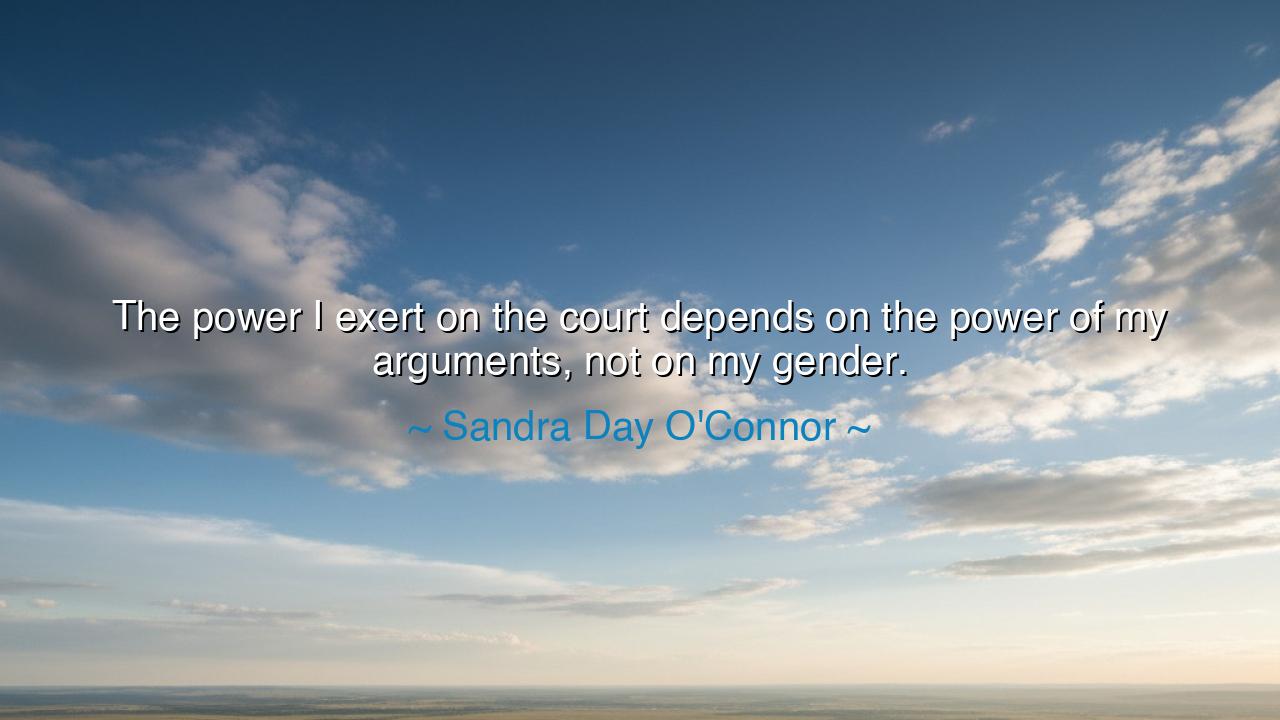
The power I exert on the court depends on the power of my






Hearken, children of the ages, to the resolute words of Sandra Day O’Connor, who proclaimed: “The power I exert on the court depends on the power of my arguments, not on my gender.” In these words lies the eternal truth of merit, reason, and the triumph of intellect over prejudice. Authority and influence are derived not from the vessels that bear them, but from the clarity, force, and persuasiveness of thought, demonstrating that the strength of conviction outweighs the superficial judgments of society.
O’Connor teaches that true authority is anchored in reasoned argument. The worth of counsel and judgment is measured by logic, insight, and the ability to illuminate truth, not by the identity, station, or gender of the speaker. In this, she reminds us that equity and justice are sustained by intellect and moral clarity, and that societal preconceptions must yield to the power of reason and evidence.
Consider the life of Sappho of Lesbos, whose voice and verse transcended her era, commanding admiration and influence despite the constraints placed upon her gender. Her words endured because of the strength of their insight and beauty, not because of her station or identity. In this, O’Connor’s principle is mirrored: power and respect are earned through substance, not circumstance.
The ancients themselves revered the principle of reason as the true measure of authority. Greek philosophers, Roman jurists, and scholars of the East all insisted that judgment, discourse, and governance must be guided by wisdom, not social expectation. O’Connor’s reflection echoes this timeless truth: the force of an argument is sovereign, surpassing the arbitrary distinctions imposed by custom or bias.
Thus, her counsel is both exhortation and inspiration: cultivate clarity, logic, and insight, for these are the instruments by which influence is wielded and justice is secured. Let no prejudice obscure the potency of reason, and let your judgments be guided by the strength of thought, not by external labels.
Carry this teaching, children of generations yet unborn: honor the power of intellect and argument above all superficial distinction. In the courts of law, the councils of state, and the arenas of human discourse, it is the wisdom, precision, and persuasiveness of reasoned argument that commands respect, shapes destiny, and secures the enduring triumph of justice.






MTcao thi my tam
I appreciate the clarity of this idea—it’s about substance over superficiality. Yet, I’m curious about the broader implications. If the power of arguments defines influence, does that mean justice is truly impartial? Or do hidden prejudices still determine whose voice is considered persuasive? O’Connor’s words sound aspirational, almost like a vision of what fairness should be. It raises a timeless question: can true meritocracy exist when bias still shapes the arena of power?
HTDang Thi Huong Tra
This quote reminds me of the constant balance between confidence and resilience. It’s as if O’Connor is asserting control over how she’s evaluated—by the logic of her reasoning, not societal labels. But I wonder if this mindset came from necessity rather than choice. How much of her success depended on consciously rejecting gender-based assumptions to gain credibility among her peers? It feels like both a declaration of strength and a quiet act of defiance.
THNguyen thu hien
It’s a powerful message about integrity and fairness, but I question how often people—especially women in male-dominated fields—can realistically rely solely on the strength of their arguments. There’s an unspoken challenge here: to be judged on ideas rather than identity. Did O’Connor experience moments when her words carried less weight because of gender expectations? It’s inspiring, but it also exposes how much effort equality still requires, even in intellectual spaces.
TDKhuat Thi Tuyet Dung
This statement makes me think about equality in professional arenas. I admire the confidence in prioritizing logic and reason, but I also wonder if that perspective downplays the barriers women face in being heard at all. Can we truly say that gender doesn’t affect influence when so many institutions were built with male dominance in mind? I’d love to know whether O’Connor saw this as a statement of principle or of aspiration.
LNGia Linh Nguyen
I find this quote incredibly empowering because it speaks to merit over identity. Yet, I wonder if it’s ever truly possible to separate gender from perception in spaces of authority. Even when arguments are strong, biases can influence how they’re received. Does this reflect O’Connor’s ideal of justice as gender-neutral, or is it also a subtle critique of the way women in law constantly have to prove that their intellect, not their gender, defines them?